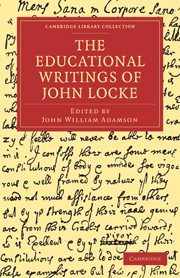INTRODUCTION
Published online by Cambridge University Press: 07 September 2011
Summary
The most general charge brought by its contemporaries against the school-room of the seventeenth century was that it failed to adapt its ideals to the profound changes which were becoming manifest in social life. Throughout Europe the school maintained the cosmopolitan type of instruction which was the natural correlative of the medieval Church and Empire. It ignored, or affected to ignore, the spirit of nationalism which was everywhere manifest; consequently, it taught no modern languages, and made no open and avowed use of modern history, literature, or geography. It admitted grudgingly a little commercial arithmetic amongst its studies, as a concession to the same demand which, at a later date, caused schools to offer teaching in shorthand or typewriting; and this was in the age of Descartes and Isaac Newton. Of modern science, then come to the birth, and of the widespread readiness to carry observation and experiment into the realm of “Nature,” the school took no account.
It is true that the “new philosophy” was not yet sufficiently advanced, elaborated, and systematized to be made an agent of education.
- Type
- Chapter
- Information
- The Educational Writings of John Locke , pp. 1 - 19Publisher: Cambridge University PressPrint publication year: 2011First published in: 1922

